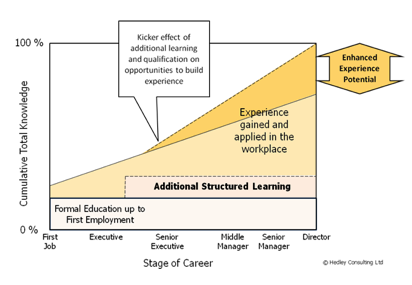Home » BLOG » Business Development » Learning through life
Learning through life
Published in PSMG Magazine
“What matters more, qualification or experience?” was the question posed to me recently. This got me thinking about the impact of formal education versus on-the-job experience on career development.
The honest answer is that both are vital, situation specific and, in many respects, one is a catalyst for the other.
By this I mean that, in some situations a through theoretical understanding will be vital to the resolution of an issue whilst, in others, the experience forged from years on the front line will be what is required. For most people, the bedrock of knowledge will be the key that opens the door to enhanced opportunities to build experience. I’m not talking here solely about a level of qualification which is required by law in order to practice or use a title (such as solicitor or architect) but also that which is required to have the knowledge to competently perform the required task.

The totality of one’s knowledge could be represented in a diagram in the form illustrated here. Total Knowledge is taken as the summation of both academic and experiential learning. At the outset of a career, most knowledge will have been acquired through formal education of one type or another and relatively little gained through experience within a work environment. As time move on, an increasing proportion of knowledge is gained through experience (which is constant and evolving) whilst the relative contribution of formal learning diminishes (since for most people there is limited opportunity for ongoing formal education). This does, of course, assume that experience is only repetitive to the extent that is required to embed it rather than simply being cyclical, year after year. The relevant question when evaluating total knowledge acquisition is, does someone have ten years of experience, or one year repeated ten times?
The Continuing Professional Development (CPD) requirements of professional bodies recognise the need to maintain structured learning alongside the building of experience in the workplace. The fact that CPD is mandated for most busy professionals is a reflection of the importance attached to CPD and professional qualification. An obvious question to ask is whether the evidence that it enhances careers in a significant way makes “the climb worth the view” when one considers the efforts which need to be expended both to qualify and then to sustain professional standing?

The proposition that level of qualification has an impact on career path (using lifetime earnings as a proxy for career development) of those in the management professions is supported by recent research conducted by London Economics on behalf of the Consultative Committee for Professional Management Organisations (CCPMO), a consortium of eight leading bodies including both the Chartered Institute of Marketing and the Chartered Management Institute. Entitled An Economic Assessment of the CCPMO the research demonstrated the economic benefit of professional qualifications and the membership of professional bodies on the career earnings of a representative individual.
The graph illustrates the summary of these finding. It can be seen that professional qualification and subsequent membership of a relevant professional body will lead to an increase of over 26% in lifetime career earnings when compared to degree level qualification alone.
But is this solely down to qualification or is there a catalytic effect that qualification can have on increasing and accelerating opportunities for experience building?
My hypothesis is simple; whilst gaining new knowledge through professional qualification is undoubtedly of great value in its own right, what should not be overlooked are the increased exposure and experiences which come as a matter of course to those with higher level qualifications. The qualification opens the door from which experience can be built. Both are important and also sequential in most cases.
Consider this diagram which illustrates the possible impact on additional structured learning on total knowledge acquisition. The kicker effect of additional structured learning can be evidenced through the ability to demand increased exposure to new experiences in one’s current employment or increased attractiveness in the job market to secure an alternative position should circumstances not change.
It is interesting that many firms which sponsor delegates through professional qualifications have a requirement that they commit to the firm for a defined period after completion of their studies. The smart firms also instigate development programmes to ensure that both parties reap the benefits of their enhanced understanding.
Of course, the charge levelled at a number of marketing and management qualifications by those in highly-individualistic sectors, such as professional services, is that they are generic in a world which is increasingly specific. The educators have responded by creating more focussed variations which sit on top of the staple core competencies. The PSMG joint venture with Cambridge Marketing Colleges (www.marketingcollege.com) is a prime example of how such collaborations can bring benefits to those with such specific needs.

By creating the world’s only professional services qualification which is accredited by the Chartered Institute of Marketing, this joint venture bridges the divide between academia and practice. It is a dual-qualification, at the end of which successful delegates are awarded both the CIM Professional Diploma (the core qualification) together with the Cambridge Marketing College / PSMG Professional Services Diploma (demonstrating their focused learning in the sector).
Such a direct link between classroom and workplace delivers structured learning in a way which makes its application in practice a requirement of the programme. It is clear that a recognition of the importance of both qualification and experience lies at the core of a successful approach to career planning and personal development for markers in the professional services arena.
This article was published in January 2009 by PSMG Magazine. To read the original article click here.
You may also like
Search
Categories
Recent Posts
- Fighting fit
- The Challenges Of Leadership Are Different To The Challenges Of Management
- The Cultural Dimensions Of Leveraging Institutional Knowledge
- A knowledge-led approach to business development is key to law firm resilience
- Team Morale Is Directly Linked To The Ability To Deliver Differentiated Client Services
